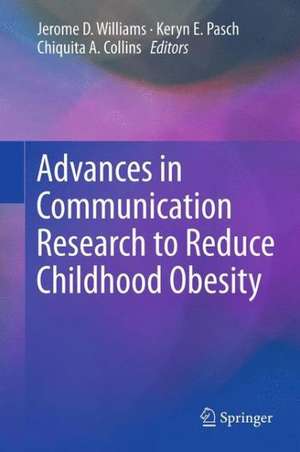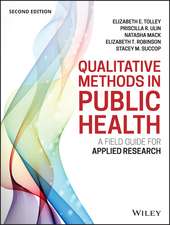Advances in Communication Research to Reduce Childhood Obesity
Editat de Jerome D. Williams, Keryn E. Pasch, Chiquita A. Collinsen Limba Engleză Hardback – 12 feb 2013
| Toate formatele și edițiile | Preț | Express |
|---|---|---|
| Paperback (1) | 1008.41 lei 39-44 zile | |
| Springer – 5 mar 2015 | 1008.41 lei 39-44 zile | |
| Hardback (1) | 1097.34 lei 6-8 săpt. | |
| Springer – 12 feb 2013 | 1097.34 lei 6-8 săpt. |
Preț: 1097.34 lei
Preț vechi: 1155.09 lei
-5% Nou
Puncte Express: 1646
Preț estimativ în valută:
210.08€ • 218.36$ • 174.18£
210.08€ • 218.36$ • 174.18£
Carte tipărită la comandă
Livrare economică 06-20 februarie 25
Preluare comenzi: 021 569.72.76
Specificații
ISBN-13: 9781461455103
ISBN-10: 1461455103
Pagini: 576
Ilustrații: XXXII, 542 p. 76 illus.
Dimensiuni: 155 x 235 x 35 mm
Greutate: 1.06 kg
Ediția:2013
Editura: Springer
Colecția Springer
Locul publicării:New York, NY, United States
ISBN-10: 1461455103
Pagini: 576
Ilustrații: XXXII, 542 p. 76 illus.
Dimensiuni: 155 x 235 x 35 mm
Greutate: 1.06 kg
Ediția:2013
Editura: Springer
Colecția Springer
Locul publicării:New York, NY, United States
Public țintă
ResearchNotă biografică
Jerome D. Williams is the Prudential Chair in Business and Research Director of the Center for Urban Entrepreneurship and Economic Development, in the Department of Management and Global Business, Rutgers Business School-Newark and New Brunswick. His current research interests cover a number of areas in the consumer marketing domain, with an emphasis on multicultural marketing. He has conducted research on marketing communications and promotion strategies targeting multicultural market segments and consumer behavior of multicultural market segments related to public health communication issues. He was a member of the Institute of Medicine Committee on Food Marketing and Diets of Children and Youth that authored the report Food Marketing to Children and Youth: Threat or Opportunity? Keryn E. Pasch is an Assistant Professor in the Department of Kinesiology and Health Education at the University of Texas, Austin. She received her Ph.D. in Epidemiology with a minor in Interpersonal Relationships Research from Division of Epidemiology and Community Health at the University of Minnesota and her Master’s in Public Health in Health Behavior and Health Education from the School of Public Health at the University of North Carolina at Chapel Hill. Dr. Pasch was also a National Cancer Institute Postdoctoral Fellow in Cancer Prevention and Control in the Michael and Susan Dell Center for Health Living at the Austin Regional Campus of the University of Texas School of Public Health. Dr. Pasch’s research program focuses on the influence of food and beverage advertising and alcohol advertising on youth risk behaviors as well as the factors that may alter the influence of advertising on behavior. Currently, she has a NIH funded grant to document and describe outdoor food and beverage advertising around schools. Her research also focuses on how risk behaviors, including sleep, substance use, and obesity-related behaviors, may co-occur among youth as well as on developing preventive interventions to address these behaviors. Dr. Pasch is also the Chair of the Early Career Preventionist Network of the Society for Prevention Research. Chiquita A. Collins is the Assistant Dean for Diversity and Cultural Competence and Assistant Professor of General Internal Medicine at Johns Hopkins University School of Medicine. She has served as the Health Equity Research Director at Altarum Institute, a nonprofit health systems research and consulting organization serving government and private-sector clients, as well as a consultant with the Office for the Elimination of Health Disparities for the Texas Department of Health and Human Services. Her research interests focus on the trends and determinants of socioeconomic and racial differences in health. After completing her doctorate at the University of Michigan, she was a Robert Wood Johnson Foundation Scholar in Health Policy Research at the School of Public Health, University of California, Berkeley. Her article with David R. Williams, “US Socioeconomic and Racial Differences in Health: Patterns and Explanations,” received the distinction as one of the most cited in the Annual Review of Sociology during a ten-year span. Her published work was used to help inform the making of the award-winning PBS documentary, Unnatural Causes: Is Inequality Making Us Sick?
Textul de pe ultima copertă
Limited-edition flavor promotions. Pop-ups on the Net. Junk food blogs. Cereal ads in cartoon shows. Between traditional and emerging media, today's youth are exposed to more advertisements for food and beverages than ever--and, unfortunately, the rising number of overweight and obese children and teenagers reflects this, as do the alarming rates of weight-related disease among young people.
Advances in Communication Research to Reduce Childhood Obesity focuses not only on the power of media in driving food choices in youth, but how these same media may be harnessed in reversing the obesity epidemic. Spanning psychology, marketing, and policy, the book explores the range of advertising strategies targeting young people, salient technological innovations, food industry responses to recent policy initiatives, and issues concerning groups who are at greater risk such as minors from lower-income households who are often faced with food insecurity and poor nutrition, which typically impact communities of color, and pre-teens. Its focus on the multiple levels of communication across these concerns offers readers important insights into both the scope of the problem and the opportunities for solutions. Included in the coverage:
Advances in Communication Research to Reduce Childhood Obesity is thought- and action-provoking reading for applied researchers in public health, health promotion, health psychology, maternal and child health, obesity epidemiology, health marketing, and health education.
Advances in Communication Research to Reduce Childhood Obesity focuses not only on the power of media in driving food choices in youth, but how these same media may be harnessed in reversing the obesity epidemic. Spanning psychology, marketing, and policy, the book explores the range of advertising strategies targeting young people, salient technological innovations, food industry responses to recent policy initiatives, and issues concerning groups who are at greater risk such as minors from lower-income households who are often faced with food insecurity and poor nutrition, which typically impact communities of color, and pre-teens. Its focus on the multiple levels of communication across these concerns offers readers important insights into both the scope of the problem and the opportunities for solutions. Included in the coverage:
- The strategic nature of marketing to children and adolescents by food and beverage companies.
- The role of schools in food and beverage marketing.
- A multi-method study of how youth perceive and evaluate food advertising.
- First Amendment implications for combating obesity through regulation of advertising.
- Targeted marketing of junk food to minority youth: communities fight back.
- Leveraging industry efforts to fight childhood obesity.
Advances in Communication Research to Reduce Childhood Obesity is thought- and action-provoking reading for applied researchers in public health, health promotion, health psychology, maternal and child health, obesity epidemiology, health marketing, and health education.
Caracteristici
Brings research from media and communication studies to the design of health interventions to address child obesity
Special focus on social media and racial and ethnic health disparities
Emphasis on topics related to how the media communicate health-related messages about food, nutrition and diet that influence childhood obesity
Special focus on social media and racial and ethnic health disparities
Emphasis on topics related to how the media communicate health-related messages about food, nutrition and diet that influence childhood obesity













